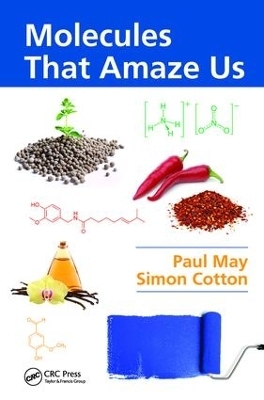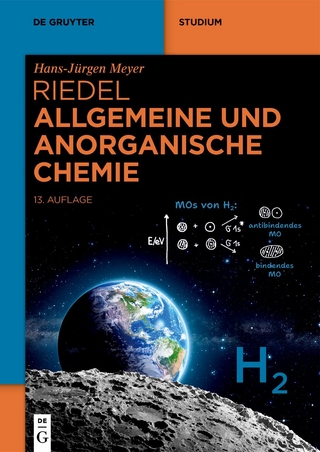
Molecules That Amaze Us
CRC Press (Verlag)
978-1-138-41025-1 (ISBN)
- Titel z.Zt. nicht lieferbar
- Versandkostenfrei
- Auch auf Rechnung
- Artikel merken
The world is composed of molecules. Some are synthetic while many others are products of nature. Molecules That Amaze Us presents the stories behind many of the most famous and infamous molecules that make up our modern world. Examples include the molecule responsible for the spicy heat in chilies (capsaicin), the world�s first synthetic painkiller (aspirin), the pigment responsible for the color of autumn leaves (carotene), the explosive in dynamite (nitroglycerine), the antimalarial drug (quinine), the drug known as "speed" (methamphetamine), and many others.
Other molecules discussed include caffeine, adrenaline, cholesterol, cocaine, digitalis, dopamine, glucose, insulin, methane, nicotine, oxytocin, penicillin, carbon dioxide, limonene, and testosterone. In all, the book includes 67 sections, each describing a different molecule, what it does, how it is made, and why it is so interesting.
Written by experts in the field, the book is accessible and easy to read. It includes amusing anecdotes
Paul May is a professor of physical chemistry at the University of Bristol, where he obtained his PhD. He leads a research group that studies the fabrication of thin films of artificial diamond. He has been awarded both a Ramsay Memorial Fellowship and a Royal Society University Fellowship. He also received the RSC Higher Education teaching award for innovative use of IT in chemistry teaching. He has written nearly 200 scientific articles and currently maintains the Molecule of the Month website.Simon Cotton is an honorary senior lecturer in the School of Chemistry at the University of Birmingham, UK. Dr. Cotton obtained his BSc and PhD at Imperial College London. His research focuses on the chemistry of transition metals, particularly iron and cobalt, as well as scandium and the lanthanides. Dr. Cotton has published various peer-reviewed articles and five books on the chemistry of the d- and f-block elements. He has written a column titled Soundbite Molecules for the magazine Education in Chemistry, and dozens of Chemistry in its Element podcasts for the RSC's Chemistry World website. In 2005 he shared the Royal Society of Chemistry Schools Education Award. His book Every Molecule Tells a Story is also published by CRC Press.
Adenosine Triphosphate (ATP). Adrenaline/Epinephrine (Noradrenaline/Norepinephrine). Ammonium Nitrate. Artemisinin. Aspirin. Caffeine. Capsaicin. Carbon Dioxide. Carotene. Chlorophyll. Cholesterol. Cisplatin. Cocaine. DEET. CF2Cl2. DDT. Digitalis. Dimethylmercury. Dimethylsulfide. Dopamine. Epibatidine. Estradiol. Glucose. Glycerol. Heavy Water. Heme. Hexenal. Hydrogen Peroxide. Insulin. Kisspeptin. Lauric Acid. Limonene. Linoleic Acid. LSD. Medroxyprogesterone Acetate. Methamphetamine. Methane. 2-Methylundecanal. Monosodium Glutamate. Morphine, Codeine and Heroin. Nandrolone. Nicotine. Nitrous Oxide. 1-Octen-3-ol. Oxygen (and Ozone). Oxytocin. Paracetamol (Acetaminophen). Penicillins. Prostanoic Acid and Prostaglandins. Psilocybin and Mescaline. Quinine. Sodium Hypochlorite. Serotonin. Skatole. Sucrose. Sweaty' Acid, (E)-3-Methyl-2-Hexenoic Acid. Taxol (Paclitaxel). Testosterone. Tetrahydrocannabinol (THC). Tetrahydrogestrinone (THG). Tetrodotoxin. Thujone. Trimethylamine. TNT. Vancomycin. VX. Water. Bibliography. Index.
| Erscheinungsdatum | 07.04.2022 |
|---|---|
| Verlagsort | London |
| Sprache | englisch |
| Maße | 156 x 234 mm |
| Gewicht | 1530 g |
| Themenwelt | Naturwissenschaften ► Biologie |
| Naturwissenschaften ► Chemie ► Anorganische Chemie | |
| Naturwissenschaften ► Chemie ► Organische Chemie | |
| ISBN-10 | 1-138-41025-X / 113841025X |
| ISBN-13 | 978-1-138-41025-1 / 9781138410251 |
| Zustand | Neuware |
| Haben Sie eine Frage zum Produkt? |
aus dem Bereich


